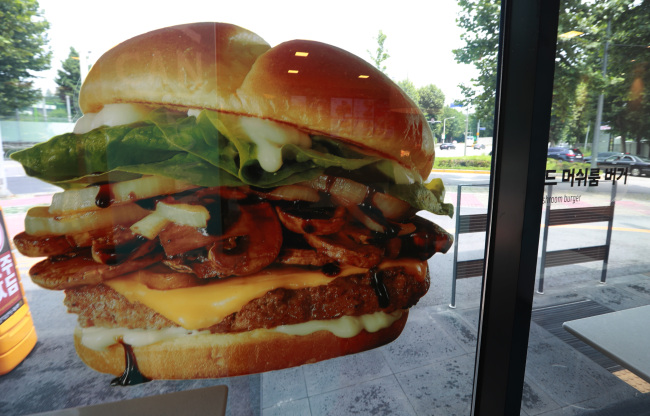A lawsuit filed against McDonald’s Korea claiming that a 4-year-old contracted a condition causing kidney failure after consuming a hamburger at the fast-food chain has been spreading fear about the safety of burger patties.

(Yonhap)
Earlier this month, a woman surnamed Choi filed a suit against McDonald’s Korea claiming that her daughter became sick with hemolytic uremic syndrome after eating a Happy Meal at a McDonald’s branch in Pyeongtaek, Gyeonggi Province.
The child suffered kidney failure as a result of HUS, leaving her to face a lifetime of dialysis, according to the suit, which pointed to an undercooked burger patty as the cause of HUS.
McDonald’s Korea has responded to the suit by saying that the company will “cooperate fully with the investigation to determine the exact cause and facts surrounding the case.”
However, the company denied suspicions that patties had been undercooked or made with beef intestines, which are known to carry the O157 bacteria that leads to HUS. The O157 bacteria is neutralized when food is fully cooked.
“The patties in question are not made with beef but with Korean pork, and are produced in facilities that follow government-certified HACCP protocol,” the company said through a statement.
McDonald’s also said that the food safety checklist at the Pyeongtaek outlet showed no problems with the cooking process, and that other similar products sold on the same day did not result in further complaints.

Activists hold a press conference protesting McDonald’s Korea’s response to the “hamburger disease” lawsuit in front of the company’s Seoul headquarters Friday. (Yonhap)
Since the case was filed, other consumers have come forward claiming they had eaten McDonald’s products that were undercooked, or that a child had developed bloody diarrhea after consuming a McDonald’s product.
Prosecutors are currently consulting with medical experts to determine the facts of the case. According to the Ministry of Food and Drug Safety, this is the first time that a suit has been filed against a food manufacturer related to HUS in the country.
The disease is most commonly associated with strains of E.coli bacteria such as O157 that release chemicals known as shiga toxins. The toxins damage red blood cells, which clog the filtering system in the kidneys.
According to the US Center for Disease Control, symptoms of HUS appear usually about three to four days after being exposed to the toxin-releasing bacteria, although the incubation period can be as short as one day. In the current case against McDonald’s, the child allegedly fell sick on the same day as ingestion.
Young children under 5 are said to be especially susceptible to HUS. “More than 85 percent of patients with the most common form of HUS recover complete kidney function,” according to the Children’s Hospital of Philadelphia in the US.
The disease was given the nickname “hamburger disease” after a mass outbreak of HUS in the United States in the 1980s caused by contaminated hamburger patties sold at McDonald’s outlets. It was the first time O157 was linked to ground beef. Similar cases of diners falling ill with HUS from undercooked meat products also occurred at Jack-in-the-Box in 1993 and Sizzler in 2000.
However, HUS can be carried by various types of food including raw milk, fruits, vegetables and juice. It can also be transmitted through close contact. For instance, an outbreak of HUS resulted from contaminated lettuce at American fast-food chain Wendy’s in 2006.
Still, fears about HUS caused by hamburger patties have spread quickly through Korea as the case became public. The relative obscurity of the disease combined with Korea’s hypersensitive consumer environment, especially when it comes to children’s products, fanned the anxiety.
The case spiked public interest in the level of sanitation at fast-food restaurants, and government agencies quickly responded with promises of sanitation checks.
Rep. Hong Chul-ho of the Bareun Party recently released information from the Food Safety Ministry that showed 626 health and sanitation violations at eight different hamburger franchises between 2014 and 2017. Regional government agencies have put forward promises to conduct sweeping sanitation checks on hamburger chains.
However, authorities still face criticism that the existing system for responding to potential health dangers in consumer goods is inadequate, partly because it fails to educate the public and keep panic from spreading.
“The Food Safety Ministry has said that HUS can occur after consuming undercooked ground meat, but it must alleviate consumer worries by explaining precisely when in the cooking process problems may occur and what other food may be cause for concern,” the Korea National Council of Consumer Organizations said in a statement.
By Won Ho-jung (
hjwon@heraldcorp.com)



![[Herald Interview] 'Amid aging population, Korea to invite more young professionals from overseas'](http://res.heraldm.com/phpwas/restmb_idxmake.php?idx=645&simg=/content/image/2024/04/24/20240424050844_0.jpg&u=20240424200058)



